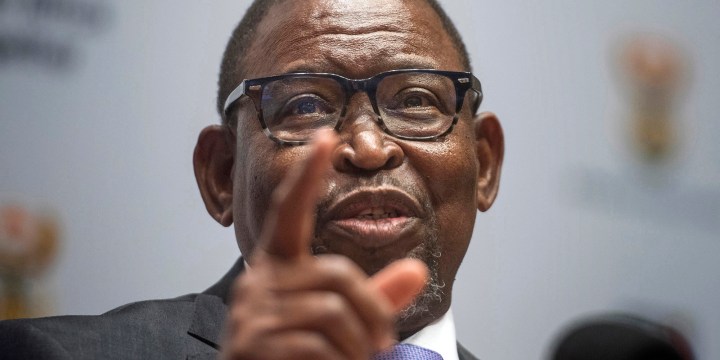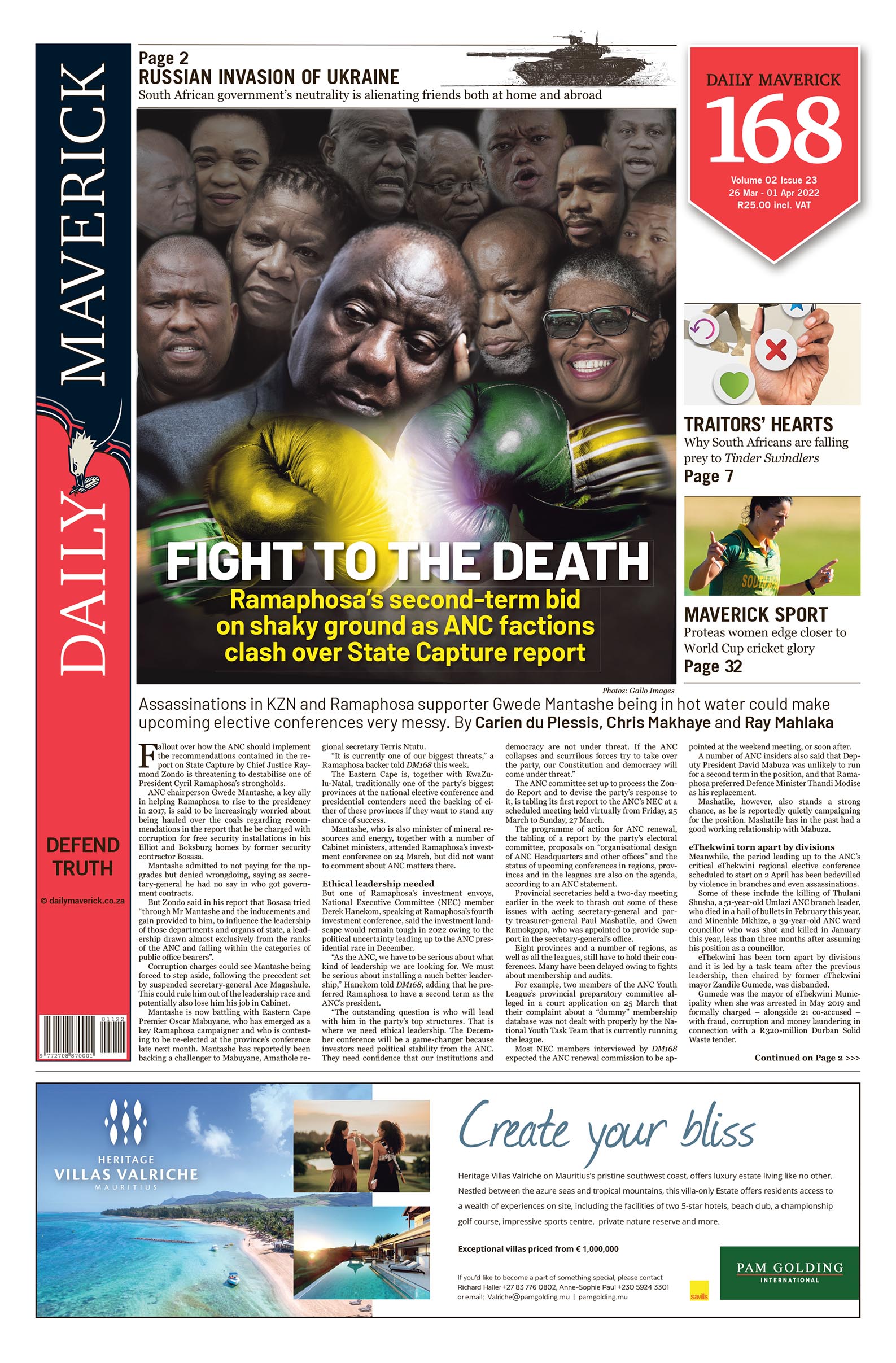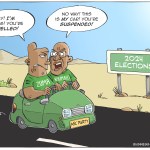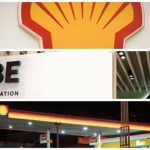INVESTMENT LANDSCAPE
Godongwana admits South Africa is a hard sell

In addressing the thorny issue of attracting investors to South Africa, Finance Minister Enoch Godongwana and Derek Hanekom deserve full marks for their honesty.
President Cyril Ramaphosa’s fourth investment conference felt like South Africa was a country with no daunting problems and a parallel universe in which everything, from the economy to service delivery, functions smoothly.
In his speech to 1,000 delegates in Johannesburg’s swanky business district of Sandton on 24 March, Ramaphosa didn’t mention the country’s unemployment crisis or the July riots that dented confidence in the rule of law.
He also didn’t mention Russia’s invasion of Ukraine and the threat of a world war, nor the impending end of the commodities boom that will leave public finances vulnerable. Prominent executives were overwhelmingly optimistic about investment opportunities in South Africa and repeated their willingness to partner with a recalcitrant government.
But Finance Minister Enoch Godongwana, who was long the ANC’s economic policy wonk, injected a dose of reality into Ramaphosa’s investment conference. After all, he knows an uphill battle when he sees one.
“We are a hard sell for a variety of reasons,” Godongwana tells DM168 in an exclusive interview, describing how difficult it is to convince investors to pour investments into South Africa. “We’ve just come out of [a period of] State Capture, corruption [and] crime… The dysfunction of some state-owned enterprises is impacting the economy, whether we are talking about electricity or talking about logistics, all of those things are working against what we are trying to achieve.”
Godongwana’s views are shared by Derek Hanekom, a former Cabinet minister who is now one of Ramaphosa’s investment envoys responsible for promoting South Africa as an attractive investment destination.
Hanekom says the social unrest in July last year was a “blow to investor confidence” and the absence of prosecutions for the perpetrators of the violence (till this day) makes it difficult to sell the South Africa investment story. The rule of law and prosecution of wrongdoers are important considerations before investors commit their capital in any country.
Hanekom believes the investment landscape will still remain tough in 2022 owing to the political uncertainty leading up to the ANC presidential race in December. “As the ANC, we have to be serious about what kind of leadership we are looking for. We must be serious about installing a much better leadership,” Hanekom tells DM168, adding that he would prefer Ramaphosa to have a second term as the ANC’s president.
“The outstanding question is who will lead with him in the party’s top structures. That is where we need ethical leadership. The December conference will be a game-changer because investors need political stability from the ANC. They need confidence that our institutions and democracy are not under threat. If the ANC collapses and scurrilous forces try to take over the party, our Constitution and democracy will come under threat.”
A cynic might say that Godongwana and Hanekom are stating the obvious or that corruption and crime can hardly be spoken about in the past tense. But at least they are being straightforward about such issues.
South Africa is pursuing major gas deal — and Russia wants in
A breeze of reforms
On the bright side, Godongwana has highlighted the government’s recent progress with pro-growth and investment structural economic reforms in the energy, digital economy, and transport and logistics sectors. Structural reforms are designed to modernise the fabric of an economy and the regulatory framework in which businesses and people operate. They essentially make it easier for businesses to do business and, in turn, grow the economy and create jobs.
A prime example of the reform progress is the government’s recent move to release radio frequency spectrum to mobile operators for the first time in 18 years, which Godongwana describes as a “significant milestone in our reform agenda”. Mobile operators, including Vodacom and MTN, spent R14.4-billion to buy spectrum, the release of which brings the promise of improved telecommunications services and lower mobile data costs.
“If you look at the effort, against all of those things [or problems] that I’ve mentioned, the work we are doing in order to change things around … is massive. For instance, if you look at what we’ve done with electricity, we are trying to make sure there is competition on the generation side,” says Godongwana.
This is in reference to the government’s plans of splitting Eskom into three units (generation, transmission and distribution), as well as allowing private players to generate electricity for their own needs of up to 100MW. He also noted initiatives to improve the efficiency and competitiveness of South Africa’s ports by involving private sector players. Godongwana conceded to the widely shared criticism that the government was not moving fast enough on structural reforms.
Accelerating reforms is important because the commodities boom (higher commodity prices and demand), which improved the near-term outlook for the government’s revenue, won’t last forever. Godongwana is mindful of this, saying there are two important factors that will negatively impact public finances and the economy when the boom slows down.
“One is whether we have sufficient electricity. The other is whether mining companies can ship the product to the ports, whether Transnet has sufficient locomotives and whether crime is not impacting [Transnet’s railway] cables. Those are headwinds for me.”
The private sector is optimistic
Big business seems more optimistic and committed to investing in South Africa because, unlike previous investment conferences, Ramaphosa was armed with demonstrable progress on the structural reforms front.
Discovery CEO Adrian Gore offered an upbeat note at the conference, saying the narrative about South Africa was too negative. For investments and the country to thrive, the narrative needs to be more positive, says Gore. “The investment opportunity tactically is that the narrative is much worse than the reality and if you are an astute investor that … is where you can make super-profits. The narrative here is continuously negative. But the country is more resilient than people think. The economy is more resilient and bigger than people give it credit for.”
Outgoing Anglo American CEO Mark Cutifani urged businesses to support the government in building the economy and a capable state. “We need to stand up and speak responsibly in support of these initiatives and talk about what we can do to help the government achieve them. As big business, we have to support our political leaders.”
Ramaphosa has reached 95% of his five-year target to raise R1.2-trillion in investments – a target he set in 2018 after he was elected as the country’s president to replace Jacob Zuma, whose presidency decimated business confidence and investment spending. At Ramaphosa’s investment conference this year, companies and financial institutions pledged 83 investment projects worth R332-billion, bringing the total investment pledges to R1.14-trillion since 2018. Ramaphosa expects his original target of R1.2-trillion to be met or exceeded by next year.
Critics of Ramaphosa’s investment drive say that many of the investment pledges are not new because companies were planning to roll them out anyway as part of their five- or 10-year capital allocation programmes. Many executives came to the investment conference simply to pledge investments that were already budgeted. And the pledges, critics argue, are not enough to lift South Africa’s investment rate, which remains too low. DM168
This story first appeared in our weekly Daily Maverick 168 newspaper which is available for R25 at Pick n Pay, Exclusive Books and airport bookstores. For your nearest stockist, please click here.


















Hanekom wants much better leadership, ethical leadership. Then he will have to look outside of the ANC cadre structures. Even from the private sector there seems to be double-speak. Outgoing AngloAmerican CEO wants support for building the economy, which sounds great – until you realise that AngloAmerican has taken its corporate office and most of its business out of South Africa in the past 20 years.
If Cyril does not first fix Eskom, Transnet, PRASA, Denel, hospitals, schools, potholed roads, theft of cables and metals infrastructure, water and sanitation, strengthen the rule of law and ensure that those responsible for the July riots are held accountable then many of these private sector investment commitments will evaporate. Multimillion dollar investments in new factories, technologies and skills will not see the light of day if ports, rail and road infrastructure prohibit efficient supply chains and if there is no confidence in the application of the rule of law without fear, favour and prejudice!